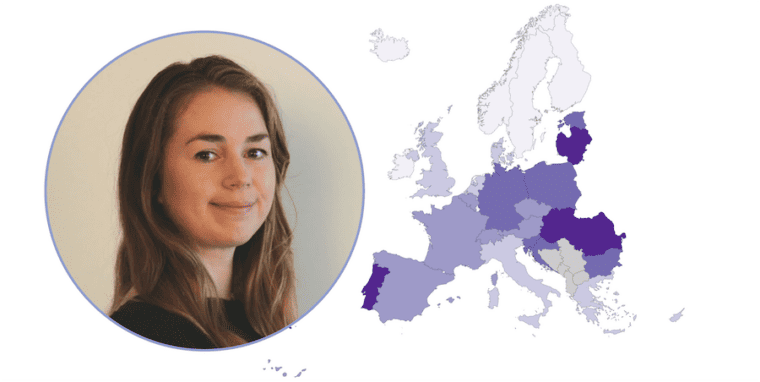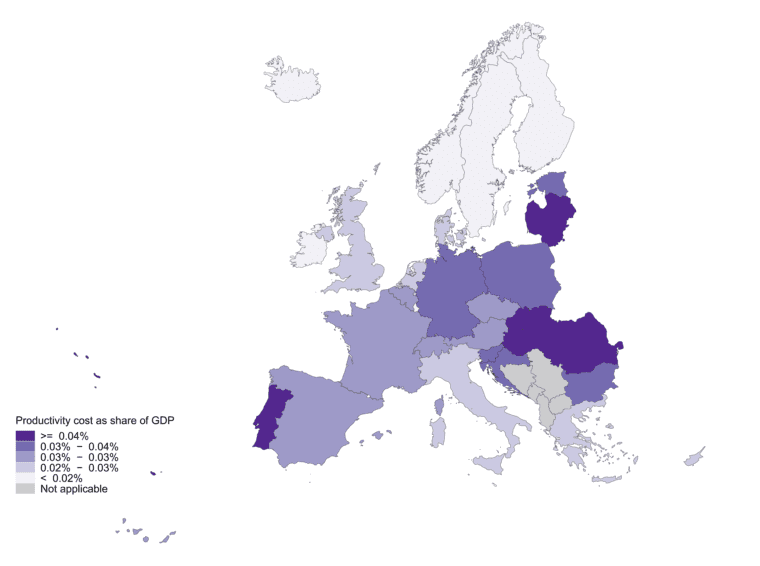
Alcohol and cancer: an established cause
Drinking alcohol increases the risk of at least seven different cancer types. These include cancers of the mouth and throat, the oesophagus, the breast, the liver, and bowel.
On average, people in Europe consume more alcohol per person than any other part of the world. We think that this high level of drinking is likely to produce a substantial cost to society through alcohol-related diseases, including cancer. So in our latest study, we tried to put a number on how big that cost was by calculating the amount of potential income – or productivity – that was lost due to deaths from cancers caused by drinking alcohol.
Deaths from cancers caused by alcohol cost nearly €5 billion in Europe in 2018
We estimated that more than 23,000 people aged under 65 died from cancer caused by drinking alcohol in the European Union (EU), plus Iceland, Norway, Switzerland, and the United Kingdom (UK) in 2018.
Around €4.6 billion in the 31 European countries in 2018 was lost due to deaths from cancer caused by drinking alcohol. This was nearly 0.03% of the combined Gross Domestic Product (GDP) of the 31 European countries.
Each cancer death due to drinking alcohol cost approximately €196,000 in lost productivity.
We also found inequalities in the cost of cancer deaths caused by drinking alcohol between the European countries. Malta, Luxembourg, Norway, and Sweden had the lowest costs of cancer-related alcohol deaths as a share of their national GDP. But Hungary, Romania, Slovakia, Latvia, Lithuania, and Portugal experienced the highest costs of cancer deaths caused by alcohol relative to their GDP. These countries also had the highest rates of cancer death caused by drinking alcohol.

How did we estimate the cost of deaths from cancer due to alcohol?
To calculate the cost of alcohol-related cancer deaths, we first estimated the number of people who died from cancer caused by drinking alcohol in the EU, plus Iceland, Norway, Switzerland, and the UK in 2018. We did this by combining information on alcohol drinking in each country, the increased risk of developing cancer from drinking alcohol, and estimates of the number of deaths from cancer in Europe. This method was similar to the one used in our previous study on the impact of alcohol on the global burden of cancer.
To estimate the economic impact, we then took the numbers of people who died from cancer caused by drinking alcohol and assigned each death a monetary value depending on:
- their age at death
- the average amount of income the person would have earned if they lived up to retirement age (which we capped at age 65).
This gave us the estimated loss in income or labour productivity i.e. the productivity lost.
The true cost of alcohol-related cancers is likely to be much higher
Although €4.6 billion is already quite a large sum, we believe the true cost of cancer deaths caused by drinking alcohol could be at least double if we incorporated:
- productivity losses in unpaid employment such as informal care
- income lost through potential time off work or reduced working hours due to cancer symptoms or treatment
- productivity losses among cancer caregivers such as family members while they accompany cancer patients during their treatments or provide care at other times
- the actual cost of diagnosing and treating patients before death from cancer.
What can we do about it?
At least €4.6 billion in productivity losses due to alcohol-attributable cancers in one year represents a huge loss to society that we cannot ignore. We must prioritise implementing cost-effective policies to reduce alcohol consumption and prevent cancer deaths due to alcohol.
The World Health Organization (WHO) recommends their ‘best buys’ policies for tackling non-communicable diseases. According to the WHO, the most cost-effective policies to reduce alcohol consumption are:
- increasing excise taxes on alcohol
- banning alcohol advertising
- restricting physical availability to purchase alcohol.
Through Europe’s Beating Cancer Plan, the EU Commission has committed to reviewing EU laws on alcohol taxation and marketing to young people. The EU Commission also indicated that it will review its policy on pricing of alcoholic drinks and initially proposed mandatory health warnings on alcohol labels.
With support from the EU Commission, the WHO has created the Evidence into Action Alcohol Project (EVID-ACTION) which will help deliver the alcohol reduction objectives of Europe’s Beating Cancer Plan. EVID-ACTION’s main activities will focus on:
- health warning labels for alcoholic beverages
- capacity-building, health literacy, public knowledge and advocacy
- alcohol screening and brief interventions.
With such a high cost of alcohol-related cancer in Europe, we want our findings to drive action to reduce the economic impact and harms due to alcohol across the region.
Written by Dr Harriet Rumgay, International Agency for Research on Cancer, World Health Organization.
All IAS Blogposts are published with the permission of the author. The views expressed in this article are those of the author and do not necessarily represent the decisions, policy, or views of the International Agency for Research on Cancer, World Health Organization, or the Institute of Alcohol Studies.
